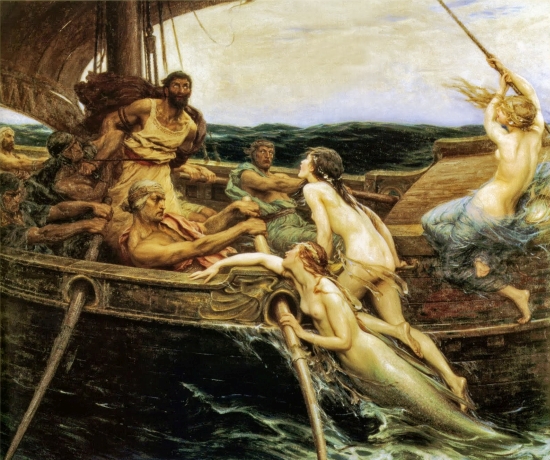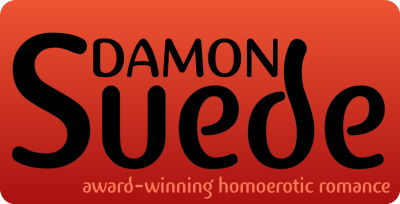Hit & Myth
the legendary underpinnings of genre tropes.
by Damon Suede (originally posted as a lecture for Romance University)

Why do romance readers and writers find
tropes so compelling?
Merriam-Webster
defines a
trope as "a common or
overused theme or device: cliché," but in the romance genre the term
has evolved to cover the constellation of formulaic themes that
"tag" a story...thematic patterns, archetypes, and story hooks which
draw audiences inexorably to certain types of narrative. These can
range from a plot device as convoluted as a secret baby to the
open-ended friends-to-lovers chestnut. Tropes spring from our most
primitive storytelling impulses, and those ancient roots are the key
to their appeal, their power, and their potential.
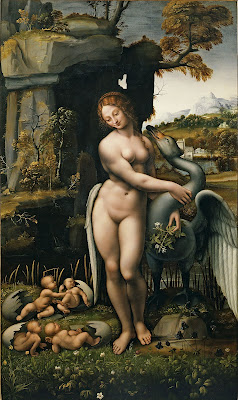 Romance fiction requires only two
carved-in-granite essentials to merit the name: a central
relationship that drives the story and a positive outcome.. Real
life may be frustrating and uncertain, but genre fiction tells
everyone what they can expect before they step inside. At its core,
escapism guarantees an entertaining trip and a satisfying
destination.
Romance fiction requires only two
carved-in-granite essentials to merit the name: a central
relationship that drives the story and a positive outcome.. Real
life may be frustrating and uncertain, but genre fiction tells
everyone what they can expect before they step inside. At its core,
escapism guarantees an entertaining trip and a satisfying
destination.
Familiar, well-loved tropes recur with
metronomic frequency in romance: mistaken identities, reformed
rakes, star-crossed virgins, doctors and nurses, not to mention
billionaires, Spaniards, and sheiks. Harlequin built a
billion-dollar empire out of its savvy marketing of recycled plot
germs as branded category lines (beginning in 1973 with the launch
of Harlequin Presents) because they had identified readers'
insatiable appetite for pleasurable
certainty.
I’m struck by the similarity of popular
romance to Greek tragedy, not in tone, but their relentless foregone
conclusions and their insistent retelling of the same stories. Greek
tragedians had to use an established set of well-known stories with
little room for modification. When ancient audiences lined up to see
Medea or
Agamemnon, they already
knew the entire plot. No one expected Medea to bake cookies or
Agamemnon to splash around with his rubber ducky. The appeal of
Greek theatre was in seeing
how the heroic characters faced their dilemmas: the granular
variation of details specific to an author and a voice.
Unlike much of life, legends and folklore
are above all fair. Myth and folktales share certain
comforting, recycled patterns that reassure its audiences that
"something good" will happen and the outcome will be satisfactory
and suitably just. Dragons get slain, virgins get rescued, and giant
wooden horses are tragedy piñatas. Their scrupulous (even ruthless)
sense of justice provides moral parameters for the cultures that
revere and repeat them. Mythology tells stories
worth retelling.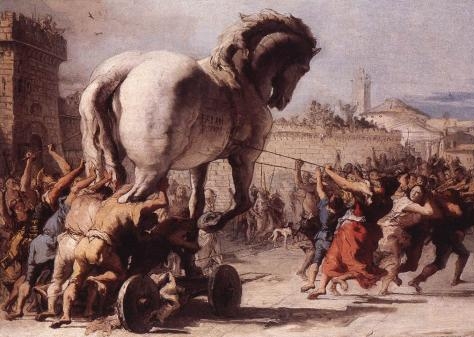
Humans love stories…we're wired to absorb
and process them; they affect our lives in primitive and startling
ways, even today. Much of what we think of as identity or culture
arises from shared narratives ingrained in us so deeply that they
feel genetic. This oral tradition unites communities by reinforcing
values and lessons that help individuals get on with the business of
living and loving.
By definition, legends must be
popular culture because
they are penned and edited by millions of voices. In essence those
mythical stories provided a limited pool of tropes in which
the playwrights could grapple with themes and relationships that
interested them and their communities. If you wanted to look at
crime and punishment you did an
Oedipus or a
Eumenides, or if you had
an idea for a debate about family honor you'd opt for a
Phaedra or
Antigone. The title alone
gave the attendees an instant thematic preview. Like an iron-age TV
Guide, the selected mythology broadcast what to expect from the
show, just as much as it pointed its writer in topical direction.
Ergo, remakes as the roots of popular entertainment and all that.
Anyhoo…what does all that have to do with the
Amnesiac Rancher's Secret Billionaire Baby?
Myth
is destiny. When we choose a book based on a trope,
our knowledge of that mythic pattern drags us towards motifs and
archetypes that speak to us as individual protagonists of our own
personal myths. We're no different than Athenians lining up for a
drama based on a recycled legend, knowing the outcome but fascinated
by the dramatic possibilities and variations. Stories that bear
retelling impart more than a simple plot or a moral lesson. They
challenge our assumptions and facilitate our internal
transformations.
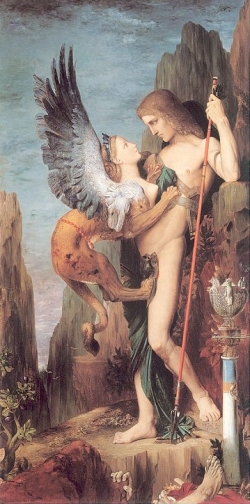 Now, for our purposes today I'm going to
stick with the Greek and Roman mythology only because it’s the most
familiar to modern readers. The argument that follows also holds
true in any mythology, be it Vedic, Inuit, or Aztec. All ancient
sagas trace and retrace patterns which we are hardwired to
anticipate and enjoy, because revisiting them over millennia reveals
deeper truths about the human condition in language a child can
understand.
Now, for our purposes today I'm going to
stick with the Greek and Roman mythology only because it’s the most
familiar to modern readers. The argument that follows also holds
true in any mythology, be it Vedic, Inuit, or Aztec. All ancient
sagas trace and retrace patterns which we are hardwired to
anticipate and enjoy, because revisiting them over millennia reveals
deeper truths about the human condition in language a child can
understand.
In category romance, the Secret Baby
trope remains a perennial favorite despite the bizarre convolutions
required to keep the kid hidden and the father in the dark. All
evidence to the contrary, Harlequin didn't invent all these
deceptive mothers out of whole cloth. Mythology is rife with mothers
peril-ized by pregnancy who hid (or ditched) their offspring after
being ravished by gods and royalty to protect them from jealousy and
worse: Perseus, Dionysos, Theseus, Jason,
Those legendary pregnancies might be
concealed from spouses, parents, or royalty…but the gods managed to
guide and protect the unexpected spawn. In heroic births like
Perseus or Theseus, the gods guided their steps to a future of
glory, for the more tragic characters like Oedipus and Paris, Fate
intervened repeatedly protecting them from wild beasts and worse so
that they might wreak ruin and infamy on their communities. In
mythology, these babies act as the agents of ineluctable Fate…Ananke
(literally "necessity" in Greek).
In Romance, the inescapable Fate in every
story is invariably a shimmering Happily-Ever-After; so unexpected
infants become a positive agent of a
benevolent Fate guiding
the couple together for good (and for Good). All those endless
secret babies act as seeds of destiny; their hidden power to
unsettle alliances and challenge assumptions works toward the happy
ending that readers demand because it is a necessity of the
genre: Ananke.
Along the same lines we find romances of
forced or sham marriage which echo the arranged marriages of
Clytemnestra, Persephone, Cadmus, and Dido. Many of these matches
end badly in the original myths, because their Fates punish their
past misdeeds. But in romance
that ineluctable Fate conspires with the entire universe to drive
them into each other's arms. The external pressure (of parents,
culture, circumstance) act as the hand of Destiny forcing them to
mingle until they stop being single.
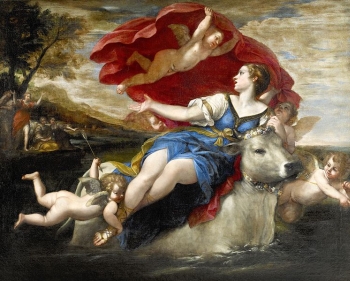 Mythology
reveals the transformation of protagonists and their community
through extraordinary circumstances. But rather than telling a
single story, they trace variations and themes that change the
status quo. In romance, these metamorphoses afford readers a
comfortable imaginative space to indulge their love of certain kinds
of hero, complication, and world.
Mythology
reveals the transformation of protagonists and their community
through extraordinary circumstances. But rather than telling a
single story, they trace variations and themes that change the
status quo. In romance, these metamorphoses afford readers a
comfortable imaginative space to indulge their love of certain kinds
of hero, complication, and world.
Long before Patty Hearst hit Stockholm,
the abductees of classical tradition (Helen, Odysseus, Europa,
Ganymede, Persephone, Adonis… to name a very few) fell hard for
their sexy captors. Violating the laws of
Modern romance tracks similar patterns…
with innamorati thrown
together by chance and desire slowly transforming each other by
their very proximity. The interplay of dominance and submission,
authority and depravity, violence and restraint, makes for a rowdy
relationship. By definition abduction violates the safe boundaries
of power, privilege, and personhood, initially reducing humans to
objects and then reminding the audience that objects can become
fascinating subjects. Xenia
in the modern world has become more subtle and complicated;
abduction from one life can be an invitation to penetrate another
world.
In the same vein, most scary pairings echo myths that marry villains to innocents (Persephone, Jason, Pasiphae), girls chained to rocks like an un-Happy Meal, (Andromeda, Hesione) and juveniles fleeing horny immortals (Io, Daphne, Hyacinth). Beauty and the Beast is a folktale retelling of Apuleius' "Cupid and Psyche" for popular consumption in Enlightenment Europe. The Aarne-Thompson tale-type index identifies all these narratives as versions of the "Search for a Lost Husband" story, and not for nothing have their unfit husbands been thoroughly redeemed in modern love stories that don't judge scary, hairy books by their covers.
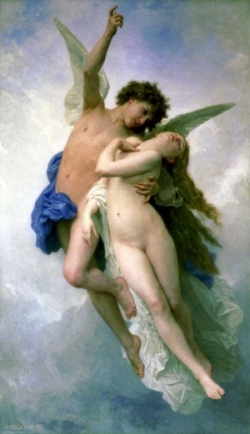 These "I married a monster" sagas are
also the basis of every reformed rake, broody ex-villain, wedded
undead, rapist-makes-good story in popular romance:
how to save a life without
ruining your own. Answer: carefully and at great cost. Any novel
about a dashing dastardly duke or werewolf-human intermarriage that
hinges on shaky trust, hidden agendas, and jealous in-laws is
walking in some very old pawprints.
These "I married a monster" sagas are
also the basis of every reformed rake, broody ex-villain, wedded
undead, rapist-makes-good story in popular romance:
how to save a life without
ruining your own. Answer: carefully and at great cost. Any novel
about a dashing dastardly duke or werewolf-human intermarriage that
hinges on shaky trust, hidden agendas, and jealous in-laws is
walking in some very old pawprints.
But I digress. :)
Obviously what I'm suggesting touches on a massive subject beyond the scope of a single blog lecture for Romance University, but… the next time you tackle a trope consider its mythic ancestry and the resonant themes evoked thereby. Every trope operating in genre fiction has mutated from these basic patterns of human storytelling…which says a lot about the importance of romance in offering narratives of transformation and an evolving mythology accessible to a modern audience.
I've chosen the above tropes at random,
but I'd make a case for all popular tropes reflecting legendary
lessons and transformations entombed in folklore, and ignored by
most of our modern culture. Mythology is more than a single story
recycled endlessly. The Heroic Journey™ monomyth purists are
right about the impact
and import of mythic structure in constructing popular literature,
but I think they've oversimplified their case to the point of
nonsense. The
variations are what
keep audiences coming back over and over, reading and rereading,
even though they know how everything turns out.
In mass-market fiction, tropes have
become a kind of mythology
capsule in which we bury ancient narratives to preserve them for
future generations. They remain popular because they are, literally,
what makes any art form popular: they speak to atavistic story
patterns rooted in our origins as a social animal.
Copyright 2013. Damon Suede. All Rights Reserved
If you wish to republish this article, just drop me a line.

Originally posted as a lecture for Romance University on 4 September 2013 which subsequently went viral; the unexpected attention inspired a follow-up interview at Publisher's Weekly a few days later with Barbara Vey.
